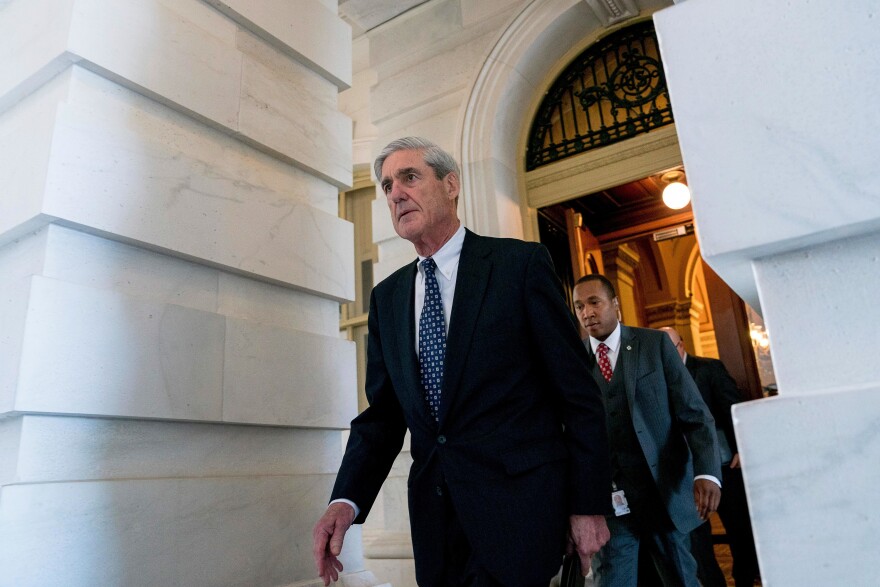Special counsel Robert Mueller's investigation has entered the West Wing.
Mueller's team is charged with looking into whether anyone on President Trump's campaign worked with the Russians who attacked the 2016 election, so it was inevitable that investigators would want to talk with aides now working in the White House.
Some, like top adviser and son-in-law Jared Kushner, communications director Hope Hicks and policy adviser Stephen Miller, were key players in the campaign as well.
Their outside lawyers did not respond to requests for comment, but Ty Cobb, the outside attorney brought in to help the White House, spoke with NPR about the probe.
"The interviews ideally will be completed by Thanksgiving or shortly thereafter," he said.
Cobb declined to get into the details of whom or even how many aides will ultimately face questioning.
"I sort of have a blood oath with Mueller that I don't get into that," he said. "It complicates his job. And it sort of defeats the confidence that people here have in me to protect them. So I can't talk about the 'who, what and where' stuff."
Cobb was asked whether this was simply a first round of interviews, focusing on lower level staff, and he insisted no, this would be all of them.
"It's pretty well set," he said. "I mean it's conceivable they may have isolated people back on, you know, on issues that they fail to ask them about," he added.
In fact, Cobb said, one aide had already been called back for a second conversation that lasted about 20 minutes.
Mueller's team has reportedly already spoken to former administration officials Sean Spicer and Reince Priebus. Members of the White House counsel's staff are on Mueller's list as well.
In addition to campaign activities like the June 2016 Trump tower meeting with a Russian delegation attended by the president's son and top aides, Mueller's investigation is also understood to be looking into the drafting of a misleading statement about that meeting, the firing of FBI Director James Comey and the case of former national security adviser Michael Flynn.
The many issues at stake in the sprawling imbroglio don't make life any easier for White House aides who must pay their lawyers and deal with investigators at the same time they try to do their day jobs.
"If everything were good and nobody had done anything, or met with the Russians, or talked about meetings with the Russians or emailed about meetings with the Russians — if everything were good, it would still be stressful," said Lanny Davis, a lawyer who served in the Clinton White House for two years handling the response to Ken Starr's independent counsel investigation.
"You would be worried about innuendo in the media, which convicts you even if there are no facts. You have the danger of being smeared in headlines nowadays especially on the Internet, where there are no facts at all. It's just pure rumors."
Davis says he's spoken with members of the Trump administration who were looking for advice about whether to hire private lawyers — yes, he said — and how to structure a White House in the midst of an investigation — try not to let it permeate everything.
Davis says he even spoke to Trump's former top adviser Steve Bannon.
But no matter how hard White House officials try to isolate the investigation, to put it out of their mind and focus on their work, "it's like a cloud or mist that never goes away," he told NPR.
Davis remembered how in the Clinton White House, everyone was so afraid of getting into the investigative crosshairs that many people stopped taking notes. He used 3-by-5 notecards that, as a practice, he'd throw out at the end of the day. He imagines aides in the Trump White House are experiencing similar highs and lows.
"You're so thrilled to be there, and when you walk down the driveway early in the morning and you see the house lit up and you think, 'Gosh, Abraham Lincoln walked down these very same stones,' " said Davis.
"You say, 'I'm so lucky to be here.' And then you walk into your office and you turn the lights on and you suddenly see some 3-by-5 cards from notes you took the day before and you think, 'Oh my God, I didn't throw those away last night. Now what do I do?' "
For his part, current White House special counsel Ty Cobb, who projects a permanently unruffled attitude, insists aides in the Trump administration are sanguine about the whole thing.
"I don't think there's, you know, much angst here," he said. Getting the truth out will be better than the worst of the breathless reporting on the investigation, Cobb argued.
That's why, he said, under Cobb's guidance, the White House posture has been full cooperation with the investigation. He also praised the investigative team itself.
"I think it's been highly professionally done. And I think they have moved with an alacrity that they're proud of and that the American people can be proud of," said Cobb.
Even so, the president and his allies often undercut the investigation, calling it a "witch hunt," or suggesting the real scandal involves Democrats.
As for how much longer the special counsel's microscope will stay on the president and his administration, White House press secretary Sarah Sanders insists things are nearing the conclusion. Cobb, on the other hand, says the timeline is up to Mueller.
Copyright 2021 NPR. To see more, visit https://www.npr.org.




